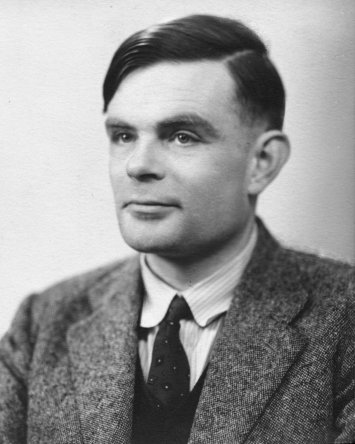And then they lynched the man who made the world

Today is the 100th anniversary of the birth of Alan Turing.
If you haven’t heard of him, here’s a brief bio. Turing was a mathematical genius, one of the pioneers of computer science, and a key figure in the Allied victory in World War II.
Turing’s early work focused on a deceptively simple question: what types of problems can be solved by a computer? In 1937 he published a paper that described the operation of a hypothetical device that could be programmed to solve any problem that was theoretically machine-solvable. This concept, the “Turing machine,” would provide one of the foundations upon which modern computer science would be built.
When his nation, the United Kingdom, found itself in a second world war with Germany, the British government recognized his ability and squirreled him away at a place called Bletchley Park to work on one of the hardest problems of the war: how to crack the codes the Nazis used to encrypt the signals that controlled their armies and fleets. More specifically, they tasked him with breaking one particular code: Enigma.
Before the war, earlier versions of Enigma had been cracked by a team of Polish mathematicians led by Marian Rejewski. Their work had come to an end when Poland fell to the Germans, but they managed to share it with their British allies before the conquest. Building on their work, Turing developed a new way to crack Enigma, but his method had a crucial twist — it was able to quickly discard thousands of incorrect solutions without needing to test them all in turn, dramatically reducing the difficulty of reaching the one true solution. Turing’s insight led to the development of the British Bombe, the device that would give the Allies access to German military communications throughout the rest of the war. The intelligence that the British derived from this source and a few other broken German codes became known as “Ultra,” and while nobody can quantify exactly how major a contribution to the Allied war effort Turing’s work on Ultra was, Prime Minister Winston Churchill told King George VI that “it was thanks to ULTRA that we won the war.”
After the war, he turned his attention back to computer science. He worked on the Manchester Mark I, one of the first computers able to be “programmed” in the modern sense by storing instructions in memory rather than having to be arduously re-wired for each task. He also devised the “Turing test,” a way to define the point at which a machine can be said to have achieved intelligence. (We have yet to devise a computer that can pass it.)
And then, on June 7, 1954, he killed himself.
The reason for his suicide had nothing to do with computers. It had everything, however, to do with bigotry. For while this man who had helped save the world from the Nazis and laid down principles that would guide the computer revolution for decades to come was brilliant, he was also a homosexual.
In Britain, in 1952, being gay was a crime. And in March of that year, Turing was arrested on charges of “gross indecency with a male.” He was presented with two possible sentences to choose from: a prison sentence, and chemical castration — a process of being pumped full of estrogen in order to suppress the libido. He chose the estrogen treatments; they turned the trim, athletic Turing, an avid runner who during the war would go to meetings in London by running the 40 miles to there from Bletchley, into a bloated wreck. And one can only imagine the shame he must have felt at being held up by his own government — the government he had worked so hard to save — as a kind of freak, an aberration of nature that needed stamping out.
So he took an apple, laced it with cyanide, and ate it.
Why am I telling you this story? Because it has always struck me as one of the great tragedies of the 20th century. Here was a man who by all accounts was a genius, and who contributed more to his nation and the free world than it could ever repay. And his compensation for this work — the thanks he received — was to be shamed and hounded until the only way out could be found through a bite from a poisoned apple. And all for a reason that would strike anyone today as utterly unremarkable.
Alan Turing deserved better than what he got from us.
Slowly, belatedly, the world has begun to awaken to this. A popular campaign in Britain in 2009 nudged Prime Minister Gordon Brown into issuing a formal apology for the British government’s treatment of Turing. And now, in 2012, people around the world are marking the 100th anniversary of his birth, just as you and I are doing here.
It’s not much. It’s not enough. But the only way good can come out of the injustices of the past is if they are remembered, and learned from. So let us today remember Alan Turing, so that we may remember to show to others the compassion we should have shown to him.
